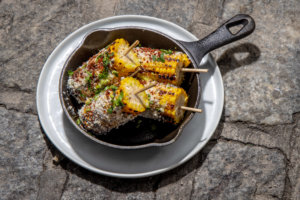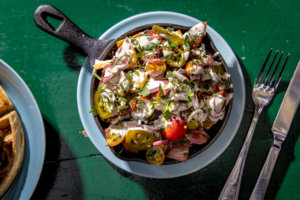World Refugee Day
On June 20, World Refugee Day is celebrated globally to recognize the movement of people around the globe. According to the United Nations, every minute twenty people leave their homes, whether due to persecution, violence, or man-made or natural disasters. This year’s theme, Every Action Counts, draws particular attention to creating more inclusive and diverse societies that welcome refugees and immigrants.
To mark this day while also looking forward to our July theme of the month, Culinary Arts, QAIC’s Communications Officer Yousra Khalil met with Nasser Jaber of The Migrant Kitchen (TMK), an immigrant-run restaurant and social good initiative. Located in New York City, TMK serves Arab-Latin fusion cooking, while also donating part of its proceeds to fight hunger.

Smoked street corn from TMK
Influenced by his family’s mixed Latin-American and Palestinian heritage, Jaber draws his culinary inspirations from both cultures. When speaking about his family’s background, Jaber highlights the contribution of Palestinian food and ingredients in Chilean cuisine, where there is a significant diaspora of Levantine Arabs, including his own Palestinian family. This exchange of foods is also visible in certain areas of Palestine, including Jaber’s ancestral village Tirmus Aaya, just outside of Ramallah, as he recounts his family’s emigration to Chile and bringing back South American delicacies such as pastelitos and more.
Initially, Nasser moved to the US in 2001 to pursue a career in finance; however, his heart and passion were for food. After living in New York for some time and meeting people from all walks of life, he saw the intersectionality of food and how it effortlessly brought people from diverse cultures together. As a result of global migration, many food items have been adopted in local cuisine. For example, Jaber found through his friends that kibbeh, tabouleh, and malfoof, while all quintessential Middle Eastern staples, have been incorporated in Dominican food because of global migration.
In 2008, with no intention of becoming a banker, Jaber found himself in the middle of financial crisis, spending much of his time in restaurants floating from one establishment to another where he was exposed to a variety of cultures, cuisines, and cooks. “How else would I know about Ethiopian, Senegalese, Sudanese, and Mexican food?” says Jaber about his learning experience.

Another dish by Jaber and Dorado
It wasn’t until 2017 that Jaber opened his own restaurant, and, despite not being financially successful, it was a community success story and received critical acclaim for its efforts in helping refugees adjust to life in the US. His first call was from UNRWA where he was approached to hire a Syrian refugee, but due to the restaurant’s declining financial situation they were unable. However, Jaber came up with an idea. Instead of simply hiring him, Jaber took the idea of communal tables – an inspiration drawn from his time working at Le Pain de Quotidien – and decided to host pop up dinners called “From Ramallah to Bogota” to help benefit any refugees that may need assistance. With the help of his friends, Jaber was able host successful dinners that eventually modeled the foundation of Jaber’s TMK initiative. What made these dinners so impactful was the approach at the end of the meal where diners would ask how they can directly help and contribute as a form of resistance. Following these first communal dinners came a wave of media attention from publishers such as Eater, The New York Times, and Vogue that paved the way to a more established offering.
TMK was initially co-founded by Jaber and his friend Dan Dorado in 2019 as a catering company with a focus on providing opportunities to immigrants. With the onset of COVID-19, the pair expanded TMK’s mission to include delivering meals to frontline workers and food insecure communities throughout New York.
Not only is TMK giving back to its New York community, it’s also changing Americans’ cultural perceptions of the Middle East and Latin America through food. The menu uniquely blends cuisines with dishes such as Chicken & Fawaffles (falafel waffles), a Middle Eastern spin on a classic comfort food, Chicken & Waffles, and No-Chos, “not your average nachos” with plantain chips and tahini. It is through these various cross-cultural flavors that TMK is introducing people to different cultures and demonstrating how they can coexist, just as their dishes bring together Middle Eastern and Latin cooking.
TMK is also proud to support migrants and refugees through employment and culinary trainings, establishing connections with the local community, and challenging preconceived notions about immigrants and displaced persons.
For more information on Jaber’s story and The Migrant Kitchen, visit their website at www.themigrantkitchennyc.com.

